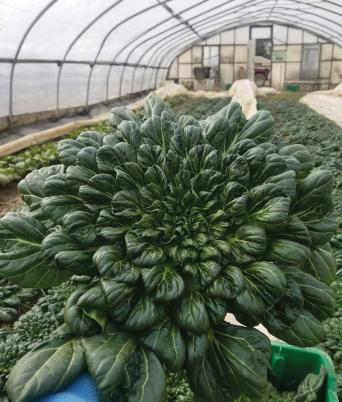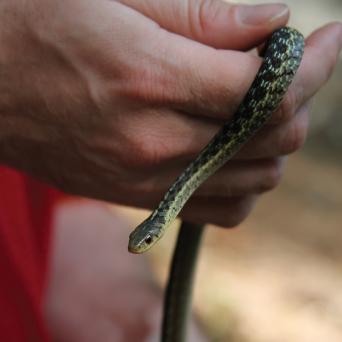
A Visit to Pennypack Farm
I felt a little out of place among the real farmers at the Pennsylvania Association for Sustainable Agriculture visiting Pennypack Farm on Dec. 11.
Then I saw a familiar face — Weavers Way Purchasing Manager (and another non-farmer) Norman Weiss. Together we walked through mud and snow to observe how a farm grows food off season, “Persephone time” in farmer parlance.
Pennypack Farm and Education Center is a nonprofit based in Horsham, PA (not to be confused with the Pennypack Environmental Center on Verree Road in Northeast Philadelphia). They farm 27 acres leased from The College Settlement of Philadelphia, and also provide farm-based programming to College Settlement campers.
In addition to supplying 400 CSA families in the summer and 180 in the winter, Pennypack Farm donates food to four different food pantries, giving away more than 8,000 pounds of food in 2017. As an education center, they offer 18-month apprenticeships and host interns and volunteers. To learn more about the farm, go to www.pennypackfarm.org.
Farm Manager Kirstie Jones led us around the fields, the five hoop houses and the storage facilities. Winter vegetables include butternut squash and stored root crops such as beets, as well as fresh cold-weather greens like kale, tatsoi and yokatta-na, a sturdy-looking Asian green that I did not get a chance to taste. One of the hoophouses is filled with it.
What surprised me the most was how hardy many plants are. Many plants like bok choy don’t even have to be covered unless the temperature is below 32 degrees. Before the last bitter cold snap, the farmers there were still harvesting lettuce and spinach from the fields.
I learned that dry plants are less frost tolerant than moist plants as dry roots are more easily damaged during a freeze. Plants in the hoop houses are watered a few days before a deep frost.
To store root vegetables, they place playground-grade sand in a trash can and add the root vegetables. Add more sand and they are ready to rest well for a while. If the root vegetables are not in a secure place, check the bottom for rodents as they usually eaten from the bottom.
I also learned that snakes are a farmer’s friend. They eat slugs, voles, mice and other critters who eat your vegetables. Clearly you don’t want venomous snakes, but there are lots of friendly snakes like black snakes, rat snakes and garter snakes that can be your helpers in fighting pests. Though I am still startled when a snake crosses my path, I sincerely welcome them. I’d love to find a way to entice them into my garden.
Talking to some of the PASA participants was fascinating. One farmer uses no mechanized tools, like tractors. She says it kills some of the beneficial life in the ground. She does everything by hand. Another couple just moved to Bradford County to work a 75-acre farm. They have already planted about 60 fruit and nut trees. They have inspired me to plant some hazelnut trees, which are native to the eastern United States.
I also met a young man who enjoys growing sweet potatoes as much as I do. He shared a trick: If you are sprouting your own sweet potatoes to acquire slips to plant, cut each slip at a nodule and put in water to grow roots. This way you can get many more slips from one sweet potato.
Another woman (there were as many women as men farmers) recommended “Golden Treasure” tomatoes, which store very well. Believe it or not, you put the tomatoes in sealed plastic and they keep for months. The skin is tougher but they are very juicy, she said.
I am thankful that so many fine farmers are trying to grow healthful food sustainably. It was an honor being among these hard-working people. Growing food may be one of the most important skills needed by future generations. I’ll keep trying on my small garden plots, and I shall definitely try to find a way to attract snakes.
Sandra Folzer is the chair of the Weavers Way Environment Committee. For more information about the Pennsylvania Association for Sustainable Agriculture, visit www.pasafarming.org.

